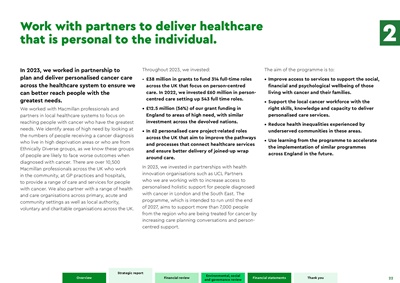
In 2023, we worked in partnership to
plan and deliver personalised cancer care
across the healthcare system to ensure we
can better reach people with the
greatest needs.
We worked with Macmillan professionals and
partners in local healthcare systems to focus on
reaching people with cancer who have the greatest
needs. We identify areas of high need by looking at
the numbers of people receiving a cancer diagnosis
who live in high deprivation areas or who are from
Ethnically Diverse groups, as we know these groups
of people are likely to face worse outcomes when
diagnosed with cancer. There are over 10,500
Macmillan professionals across the UK who work
in the community, at GP practices and hospitals,
to provide a range of care and services for people
with cancer. We also partner with a range of health
and care organisations across primary, acute and
community settings as well as local authority,
voluntary and charitable organisations across the UK.
Throughout 2023, we invested:
• £38 million in grants to fund 314 full-time roles
across the UK that focus on person-centred
care. In 2022, we invested £60 million in personcentred
care setting up 543 full time roles.
• £12.5 million (56%) of our grant funding in
England to areas of high need, with similar
investment across the devolved nations.
• In 62 personalised care project-related roles
across the UK that aim to improve the pathways
and processes that connect healthcare services
and ensure better delivery of joined-up wrap
around care.
In 2023, we invested in partnerships with health
innovation organisations such as UCL Partners
who we are working with to increase access to
personalised holistic support for people diagnosed
with cancer in London and the South East. The
programme, which is intended to run until the end
of 2027, aims to support more than 7,000 people
from the region who are being treated for cancer by
increasing care planning conversations and personcentred
support.
The aim of the programme is to:
• Improve access to services to support the social,
financial and psychological wellbeing of those
living with cancer and their families.
• Support the local cancer workforce with the
right skills, knowledge and capacity to deliver
personalised care services.
• Reduce health inequalities experienced by
underserved communities in these areas.
• Use learning from the programme to accelerate
the implementation of similar programmes
across England in the future.
Work with partners to deliver healthcare
that is personal to the individual.
22
Environmental, social
and governance review
Financial review
Strategic report
Overview Financial statements Thank you
2